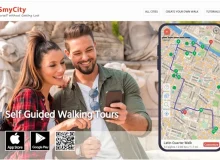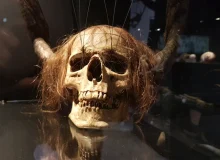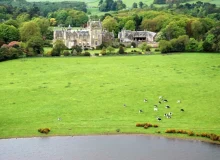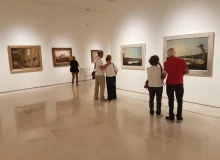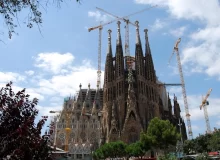Walking in Memphis
Mike Gerrard goes walking (and driving) in Memphis, visiting Graceland, Beale Street and hearing the Reverend Al Green’s Tabernacle Choir.
And I’m walking in Memphis, walking with my feet not ten feet off-of Beale but ten feet to one side, in the best place to be: Handy Park. I was headed for Beale Street but the sound of guitar, loud and live, took me by the ears and dragged me to the park, where a band of black guys played the blues.
I’ve already been driving in Memphis, in a pink Cadillac, whose upholstery has been signed by Rufus Thomas and Jerry Wexler. The cool car was Tad Pierson’s, and Tad (www.americandreamsafari.com) had picked me up at the Heartbreak Hotel, not down at the end of Lonely Street but next door to Graceland. (Since my visit the Heartbreak Hotel has become The Guest House at Graceland.)
We were going somewhere that Elvis, with his love of gospel music, would surely have gone if he had not left the building for good in 1977. We were going to the Reverend Al Green’s Tabernacle Choir, just a Hallelujah shout from Graceland down Elvis Presley Boulevard and turn right for the Lord. And Reverend Green be glad to see you, when you haven’t got a prayer. Whether you see the Reverend Green is a matter of luck, as he preaches when he’s in town, but this weekend he isn’t.
As Tad parks the pink Cadillac – the kind Elvis bought for his mom Gladys when he got rich – an elderly black man is walking unsteadily to the church door, as skinny as the walking cane that’s supporting him. Under his arm is a black Bible the size of a shoe box, and the guy stands out because he’s wearing an electric blue suit that even Elvis might have thought loud.
Behind the altar, written in blood red on a painted white scroll, it says LET GOD BE MAGNIFIED. The welcoming music is not a bit of quiet Bach on the organ but an electric guitar picking blues licks. The guitarist has a bouffant henna’d hairstyle, and his drummer is bald and wears braces over his pale blue shirt. ‘Listen to the guitarist,’ whispers Tad, who comes here most weeks whether he’s showing visitors round or not. ‘When he starts doodling behind the preaching he keeps sneaking in Hendrix riffs.’ The Church of England this is not.
The choir leader looks like a rap artist dressed in a Mafia suit. Underneath is a black crew-neck sweater, a gold chain and a neck like Mike Tyson’s but the voice of an angel. There are fifteen people in the choir, from little kids to big mommas, and they burst into a spiritual: Oh mighty God, OH MIGHTY GOD, Oh mighty God, OH MIGHTY GOD! Little girls in the pews are rocking back and forward, pigtails swinging, clapping their hands.
Two hours pass in a haze of Hallelujahs and testifying. Praise the LORD, screams the preacher, God is worthy. God is worthy, and amen, say the congregation. I have decided to take a stand, sing the choir.
The Preacher gets up and tells us: Our Pastor is the Reverend Al Green, whose voice is known throughout the world, and we expecting him today but he ain’t showed, so instead I’d like to ask our friend there from the Congregation to come and sing for us, his voice is just as sweet, just as sweet, come on up now…
At this a man in a suit that’s as pink as Tad’s Cadillac stands and sings. It’s an outrageous suit, but he looks stunning, like a diamond, with a voice that’s clear and bright as a diamond too. As we leave the service, exhausted and exhilarated, Tad says, ‘It was quiet today. When Al Green’s here it’s usually at least another hour and he works folks up into a frenzy with his preaching, they’re rolling round on the floor and have to be carried out.’
One lunchtime in the Centre for Folklore on Beale Street, while enjoying a bottle of Blackened and Crimson Voodoo Beer, I ask the barmaid what happens in Memphis if you don’t like music. She thinks for a while, as if the possibility had never occurred to her. ‘Tough,’ she says. I ask her what music’s on later. ‘3.30 we’ve got a blues/jazz kind of a band on, Little Albert Gets Even, then tonight it’s the Memphis Jazz Orchestra.’
I put a dollar in the jar on the counter, the one with the sign that says TO DRINK IS HUMAN, TO TIP IS DIVINE, walk out past the piano (‘PLEASE DON’T PLAY CHOPSTICKS’) and back into Handy Park where the band singer’s saying, ‘Some of y’all gonna remember this, some of y’all ain’t. Well if you, ever plan, to motor west…’
Now some of y’all gonna remember Elvis and some of y’all gonna remember Elvis. And I’m going to Graceland, Graceland, Memphis Tennessee, the must-see in Memphis, and say what you like about tack and kitsch and marketing and a rock’n’roll Disneyland, everyone’s gob is smacked by the Wall of Gold, a dazzling 111 (and rising) gold, platinum and multi-platinum singles and albums…. And that’s just the King’s sales in the USA.

‘Elvis has sold more records than the Beatles, Frank Sinatra and Michael Jackson put together,’ stresses the tour guide at Sun Studios, where the King was just a kid when he went in and paid four bucks for a ‘record-your-own-voice’ disc which he said was for his momma’s birthday, an excuse somewhat undermined by the fact that it was three months after her birthday when he did it, and the Presleys were so poor they didn’t own a record player. Elvis eventually got the call to make a real record, but the session wasn’t a success till he and the musicians started fooling around with a blues song by Arthur Crudup, That’s Alright Mama, and when Elvis sang the blues, rock’n’roll was born. It came out on 19 July 1954, and changed the world.

‘We’re now outside the Hotel Chisca,’ Mike Freeman tells me as I take his ‘Downtown Elvis-Style’ tour (www.memphisroadours.com), a terrific 3-hour trawl through Elvis’s life, and death, in Memphis. ‘This is where DJ Dewey Phillips broadcast his show Red Hot and Blue. He used to play all the great black blues stuff, and he was the biggest thing in Memphis music. All the teenagers listened to his show, and that included Elvis. Dewey could make a hit just by playing it and saying how much he liked it, so he was an important man.
‘Dewey Phillips became the first DJ to play Elvis on the radio. That’s Alright Mama went down a storm and listeners were phoning in saying: Who is this guy? Dewey played it over and over, played the B side over and over, and the call went out: Find Elvis! Eventually they tracked down Elvis’s mum and dad, who said Elvis was out at a movie theater. They went out and found him, and took him along to the radio studio. Dewey wanted to interview Elvis, but Elvis was this nervous teenager who wasn’t too happy about doing a live interview. Dewey said, OK, we’ll just do a rehearsal first, but he flicked the switch and Elvis didn’t know he was going out live, so he was more relaxed.’
The death of Elvis in 1977 had more than just an emotional impact on Memphis, according to Mike Freeman, who’s written two books on the King. ‘Elvis was a local guy, and though he was a superstar he just lived here in Memphis so people sort-of got used to it. Then when he died, no-one here had any idea that the entire world would start turning up just to stand outside and look at Graceland, ‘cos that’s all there was. Then they opened Graceland, and other things started to happen. At the time they were thinking of demolishing Beale Street, which had been this fantastic music place, in the heart of the black district, full of bars and clubs and where very few white people – Elvis was an exception – would venture. At that point Beale was pretty derelict in the aftermath of the riots when Dr Luther King was killed here in 1968. But because of the tourists, come for the music, it was saved. OK, so it’s touristy now but at least the local musicians have somewhere to play.’

And I walk down Beale again, feeling ten feet off-of Beale just to be here, walking from Elvis’s statue, past Elvis Presley’s Memphis club, past B.B.King’s Blues Club and Blues City Café, past the Rum Boogie Café, and I sit on a bench in Handy Park and listen to Big Jerry, who’s sitting behind a spartan drum kit (one bass, one snare, one cymbal) like a bear. Next to him he introduces Memphis James on guitar: ‘Twenty years this guy played the blues, played with Jimmy Reed, so we gonna do you a Jimmy Reed number, Bright Lights, Big City.’
They do Crosscut Saw, Walking the Dog, Green Onions. They’re watched by a small audience of black guys sitting on benches, sipping from liquor bottles wrapped in brown paper, while the tourists, black and white, male and female, young and old, stand around beneath the trees, swaying to the blues. Big Jerry and Memphis James launch into a sidewalk-shaking version of Lucille, as I drop five dollars in the hat, and go walking in Memphis, happy with the blues.








